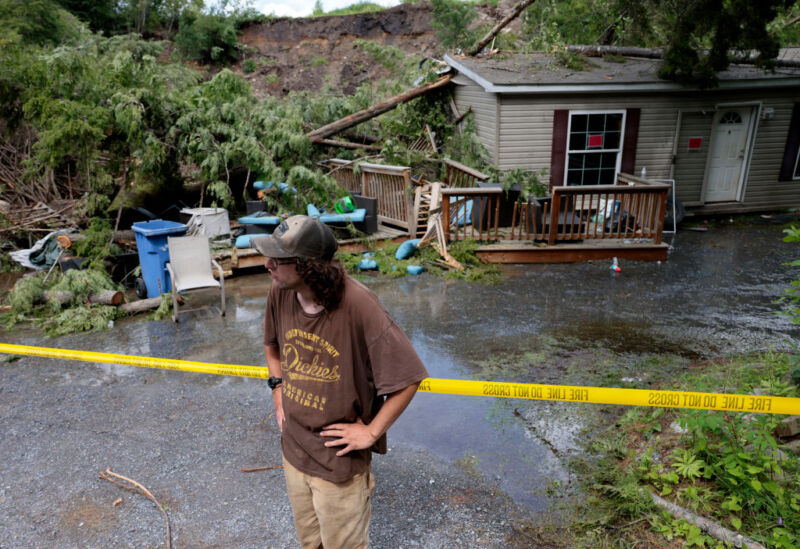
Vermont could quickly change into the primary state to power fossil gas corporations to pay their fair proportion to cowl restoration efforts from local weather change damages. This week, the state’s doubtlessly groundbreaking legislation handed a preliminary vote within the Senate, the place a remaining vote is predicted quickly that might seemingly ship the legislation to the governor’s desk. And there is reportedly broad sufficient help to override any try and veto the legislation.
By passing a legislation that mimics the Environmental Safety Company’s Superfund program—which “forces the events accountable for the contamination” of lands “to both carry out cleanups or reimburse the federal government for EPA-led cleanup work”—Vermont hopes to create a Local weather Superfund Price Restoration Program.
If enacted, the legislation might find yourself costing fossil gas corporations billions for local weather damages in Vermont alone and function a mannequin for different states equally in search of to fight their worst impacts.
Vermont Senator Dick Sears, who co-sponsored the invoice, has mentioned that the state’s climate-related prices have continued to spike whereas fossil gas corporations recorded greater than $200 billion in income in 2022, CNBC reported.
“The Local weather Superfund Act is constructed on the long-standing precept that the polluter pays,” Sears mentioned. “The harm that fossil fuels are inflicting in our communities continues to develop, with flooding within the final yr alone leading to large prices to our state.”
Final summer season, Vermont residents misplaced greater than $1 billion in property damages from catastrophic flooding displacing many, Vermont Public reported, and the latest winter was the “warmest ever recorded,” NBC Information reported. Related prices to do issues like restore damaged water mains or improve culverts are solely anticipated to go up if pressing motion shouldn’t be taken.
Predictably, fossil gas corporations have tried to squash the invoice, which might take impact as quickly as July 1. Their argument appears to carry that Vermont residents who really combusted the fuels ought to should pay for the damages. In a letter to Vermont lawmakers, the American Petroleum Institute (API)—which represents all segments of America’s pure gasoline and oil business—argued in March that the legislation is “dangerous public coverage” and “could also be unconstitutional.”
“API is extraordinarily involved that the invoice: retroactively imposes prices and legal responsibility on prior actions that have been authorized; violates equal safety and due course of rights by holding corporations accountable for the actions of society at massive; and is preempted by federal legislation,” the letter mentioned.
Amongst API’s prime issues is that the legislation doesn’t specify “the magnitude of potential charges that may consequence from its passage.”
“It might impose a substantial and vital monetary burden for conduct that legally occurred many years earlier in a approach that singles out the refining business for others’ use of fossil fuels,” API argued. “It’s patently unfair to cost a gaggle of enormous corporations that didn’t combust fossil fuels however merely extracted or refined them so as to meet the wants and calls for of the folks.”
It is true that the invoice doesn’t but assess simply how a lot Massive Oil owes for state damages. If handed, the state treasurer, Mike Pieciak, would seek the advice of the assorted databases, together with the Carbon Majors database, to calculate how a lot companies extracting fossil gas or refining crude oil between 1995 and 2024 have contributed to state greenhouse gas-related prices between 2000 and 2019.
As soon as he is aware of how a lot every firm contributed, Pieciak might be tasked with consulting scientists and estimating how a lot Vermont might want to make investments to get better from these damages, together with assessing impacts on impacts on public well being, biodiversity, financial growth, and different damages, The Guardian reported.
Inside six months after he finishes these calculations, corporations could be charged a one-time payment that could possibly be paid in installments yearly.
Finally, Vermont’s Company of Pure Sources is tasked with establishing local weather motion priorities. However fossil gas corporations could possibly be on the hook for “modernizing infrastructure, weatherproofing faculties and public buildings, cleansing up from storms, and addressing the general public well being prices of local weather change,” NBC Information reported.
In January, Pieciak advised Boston’s WGBH that he was “excited” to crunch the numbers.
Whereas API claimed that “previous emissions attributable to corporations” can’t be decided “with nice accuracy,” it is seemingly that Pieciak will take an identical route as New York State, which estimated “that adapting to local weather change might price the state greater than $150 billion by 2050,” WGBH reported. And he already has an preliminary determine from the Vermont Public Curiosity Analysis Group (VPIRG), which estimated that Vermont may have a restoration fund of roughly $2.5 billion, The Guardian reported.

